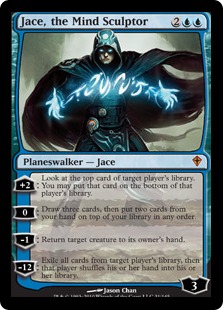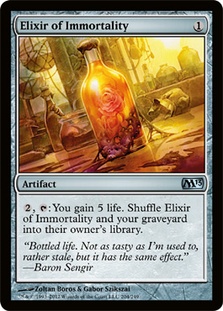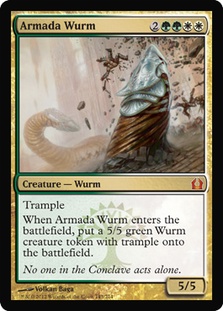Welcome back!
In today’s article, I am going to discuss how context frames whether a play is ultimately good or bad and why considering counterintuitive lines of play is important when playing Magic at a high level.
On the one hand, an article like this is kind of cool because it can encourage players to ‘think outside the box’ and challenge readers to reconsider many of the idioms considered to be truisms. But, on the other hand, many of the circumstances that are cited in this article are only applicable to a sparse fringe of game conditions and will not be directly applicable to most games.
With that in mind, it is also important to consider that much of what makes Magic such a great game and gives it so much replayability actually derives from the fringe, the weird, and the most bizarre of interactions and circumstances that arise in our games. If every game was simplistic and it was instantaneously knowable what the right or wrong play was in any given game state, then the game would be predictable, boring, and unpopular.
My intention in writing this article is to continue to press the point that becoming a good/great Magic player requires individuals to constantly refine and improve their skill sets in order to find ways of winning games that may look out of reach by thinking situations through critically and creatively.
To this end, I’m going to talk about some plays that I’ve made that completely defy common sense. Because of their unique contexts, these normally terrible plays actually ended up being quite (or perhaps at least debatably) brilliant.
Scenario #1:Â “The Coo-Coo Clock”
Submitted for your consideration:
A game of tournament Legacy is being played in Ann Arbor, MI by a man named Brian DeMars. Brian has what appears to be complete control of the third game. He has almost everything a player could possibly want: Jace, the Mind Sculptor, Counterbalance-Top, multiple counters in hand, and an end of turn Vendilion Clique that reveals his opponent has nothing. DeMars untaps, attacks his opponent down to seventeen, and passes the turn choosing not to use any of his planeswalker’s abilities (and is correct in doing so). Brian is the master of a seemingly infinite plethora of all resources—all resources sans one: time. You are now entering the Twilight Zone…
“When is it correct to use none of the abilities?”
No, I wasn’t at exactly three life with Jace at ten loyalty, and my opponent did not have Underworld Dreams in play and Volition Reigns in hand. (Which, for the record, is a pretty straightforward reason why one wouldn’t use any of Jace’s abilities.) My reason for not using Jace was even more counterintuitive than this.
The reason I didn’t activate the Jace was that there was only about three minutes left in our third game and attacking for three seven times with my Clique was my only way to actually win the game. After I had seen my opponent’s hand of all blanks, I knew that my hand of all counterspells plus the Counter-Top in play was enough to win the game without needing to use my Jace to fate seal or Brainstorm.
Here is the absolute kicker of the situation: I attacked for the last three points of damage on turn 5 (the last turn) of extra turns. If I had used my Jace every turn, I would certainly have drawn, and if I had used it even one more time more, I would have risked possibly drawing.
The key here is to recognize that within the context of the game/match, I had no shortage of ways to stop my opponent from winning. I had a Clique in play, and it was basically my only way to win. My only real problem, given the game state, was to actually win the game in the allotted amount of time.
Since I already had adequate ways to stop my opponent from winning the game (Counterbalance-Top + counterspells in hand) and my only way to win was the Clique I already had, activating Jace, the Mind Sculptor (while being ‘deceptively free’ of cost) wouldn’t actually help me win faster or not die. In fact, he is ‘deceptively free’ because he does have a cost—he costs time off the clock to use, which was the only resource that I was short of!
If I had been at the exact same board state in game 3 with fifteen minutes left in the round, I would have used my Jace, the Mind Sculptor to +2 and fate seal my opponent, and it would have 100% have been the correct play. However, because there was only three minutes left to play, simply not using him actually was the correct play, and by correct play, I mean the play that actually allowed me to win the game.
Quick Clock Facts: When you’re playing a match that is likely to go to time, it works very much to your advantage if you get the first and last turns of the extra turn cycles. Not having the last extra turn actually sucks, and you should always try to avoid it if you can.
Having the last turn is really powerful because it means you get a chance to alpha strike without the risk of ever being attacked back. Plays that would be far too risky to make under normal conditions, such as attacking all of our creatures into theirs and being dead to the swing back if they have removal, become normal and necessary under these conditions.
Inversely, if your opponent has turn 4 of turns, they are actually forced to make the risky all in attack (if they want a chance to actually win the game) and will die to your removal/combat trick + swing back!
While there are parameters for what is legal and what isn’t legal within a game of Magic, specifically with regard to stalling and abusing the clock, being aware of the clock is certainly to a player’s advantage. I usually try to get to my seat before my opponent does so that I can have the chair that faces the clock and can easily see and track the time left in my round.
The clock is a really important and potentially context/game changing variable in tournament Magic, so not being aware of it can literally only hurt your chances!
Scenario #2: “Playing Around Cards That Might Not Exist”
Would you agree to the following bet?
I’m not a good golfer, and we are on a golf course. At 100 feet from the pin, I offer you the following bet:Â
“If I miss, you get 50 cents, but if I make it, you agree to death by torture.“
(It’s a theoretical question; I’m not actually this sadistic in real life).
Is this a good bet?
If I’m only good to make this shot one out of a million times, the odds are heavily in your favor to collect a free fifty cents. However, if you lose, your loss is going to be catastrophically costly.
The principle behind this abstract scenario is the crux of my next story, which is from the semifinals of Grand Prix Boston-Worcester.
After a long, hard-fought game 1, I arrived at a situation where I was fairly certain I could stabilize the board and win the game. I had enough mana to cast Sphinx of Uthuun and cast and activate Elixir of Immortality in the same turn.
“No library? No problem.”
The Elixir was pretty relevant because I was at exactly five life and had exactly four cards left in my library, one of which was a Stormtide Leviathan. If I cast the Fact or Fiction Sphinx before I activated my Elixir of Immortality, I would be able to take whatever pile of cards my opponent gave me that included the Leviathan. Then, with no cards left in my library, I would be able to Elixir back my whole deck. I was 100% convinced this was the best play I could make, but I instead chose to make a different play. I used the Elixir of Immortality first to shuffle my graveyard back into my library and then cast the Sphinx.
Basically, I didn’t guarantee myself to draw the Leviathan. Watching the match coverage, the commentators were basically puzzled as to why I didn’t make this obvious play.
Here is why I didn’t make it:
First of all, I was fairly certain that the 5/6 flier + a free Fact or Fiction (from my new library that is almost all spells) would good enough to win the game all by itself. Meaning I didn’t actually need the Leviathan to win.
The other problem was that while I was 99.999% sure that there was no card in the M13 Limited format that would punish me for having no cards left in my library with my Elixir trigger on the stack, there was that 0.001% shred of doubt in my mind. Keep in mind that I didn’t have the luxury of looking at my opponent’s list and knowing he had no card to kill me with.
I sat there and thought and thought about whether or not there was a Stifle effect or an instant speed draw spell that he could use to kill me, and while I couldn’t think of one (because there wasn’t one), I felt that I could afford to play around the possibility that there was.
I felt that making the strictly worse play would put me at 99% to win the game, while the better play would put me at 99.5% to win the game. I could afford to play around cards that, although I couldn’t think of any specific ones, I couldn’t completely rule out the possibility of exisiting altogether.
To relate this to my golf bet example, the benefit (getting a Leviathan in a game I was almost certainly going to win anyway) wasn’t worth the risk. If there was a card that I couldn’t think of and my opponent had it, this line of play would make me lose a game that I would almost certainly have otherwise won.
I can make this example more relevant to everyday play. Say that you have a bunch of creatures on the board in a creature mirror. You are sitting there thinking about how you can possibly lose this game that you feel is already wrapped up. The only thing that comes to mind is that he could play Wrath of God to get back in it. However, you decide that he is 99.9% to not have Wrath in his deck. You don’t need to drop the rest of your creatures on the board in order to wrap it up. Do you drop the rest of your hand?
“I’m the guy who boards this in creature mirrors. I’ve made a career of assuming you won’t play around it.”
You feel like he shouldn’t have a Wrath—why would he? But what if he does? Can you afford to play around it?
Scenario #3: “Short-Term ‘Profits’ = Long-Term Losses”
My last category of context specific bad plays that I think are actually good plays takes place before the game even starts, interestingly enough.
Imagine we are drafting Return to Ravnica and crack a Temple Garden and a really sweet uncommon like Skymark Roc. You pick the Temple Garden because it’s “good value” or whatever and pass me the Roc.
“Which one would you pick first in pack 1 at FNM? On Day 2 of a Grand Prix? Why?”
Also, keep in mind that this guy is not poor or scrounging to build decks to be able to play. He doesn’t need to sell the Temple Garden to the store in order to feed his starving children. He’s got like eight of them already in his binder.
I believe that “good value” in this situation is actually terrible value over the long run.
This exact situation occurred while I was drafting yesterday, with a friend of mine picking the Temple Garden and passing me the bomb uncommon. Obviously, his deck ended up being much worse than it could have been, and I ended up with an awesome deck (as always).
After the draft, he defended losing in the first round of the single elimination event by saying that he’d basically made his money back by picking the Temple Garden. I disagreed on these grounds:
First, Temple Garden is realistically a card that retails for about ten bucks. He paid fifteen dollars to play and threw away many percentage points at winning the tournament by picking it. Part of the cost to play is assumed to be going toward the entertainment and practice, which he wasted.
Secondly, it is nigh impossible to turn a Temple Garden into a ten-dollar bill. More realistically, a dealer will give you five bucks for it. So assume you are drafting, you paid $12 bucks to play, and somebody says, “I will give you $5 to throw away your first pick and take a mediocre card over a very good card.” Would you do it?
I wouldn’t even consider it. The only way I would consider rare drafting is if the card I was throwing away a first pick for was worth significantly more than first prize in the event. Yes, I would first pick a Jace, Architect of Thought in pack 3 if I were drafting Rakdos or maybe a foil shockland.
However, I think it’s insane that people will literally sabotage themselves, time and time again, by being seduced by $3, $4, or $5. How is it even possible to learn about or improve at playing a Limited format when one routinely throws away high picks on a few bucks?
It’s worth considering that the short-term rewards of rare drafting are outweighed by the long-term consequences of mediocrity.
I understand that a lot of people won’t actually be able to compute this point of view, and that’s fine because I tend to aim my writing at an audience I envision as thoughtful people who actually care about getting better at Magic and want to play at a high level.
I’m not writing for the player who during M13 Limited sat to my left drafting B/W Exalted and whose eyes bugged out of his skull and mouth began to drool when I passed him a Garruk, Primal Hunter (which he took over a Murder) in pack 3. There are some people who simply cannot be helped.
My point in saying this is that while rare drafting has a very immediate and finite value (the price of the card one selects), not rare drafting has a quality of intangibility to it.
Getting better has value, winning has value, knowing more than your opponent’s has value—I can’t trade somebody 1x “has gotten better” for an Armada Wurm for my deck, but on the flip side, owning an Armada Wurm doesn’t exactly translate into PTQ Top 8s either, does it?
“Disclaimer: Owning this card doesn’t necessarily translate to making Top 8 at a PTQ.”
I suppose the point I’m trying to make by evoking all of these examples is that decisions and lines of play are always framed by the perspective from which they are being viewed. Plays are not always simply “wrong” or “right,” but can change with regard to how good or bad they are depending upon context.
It’s like if I ask, when playing chess, would you trade your queen for a pawn?
Most people would say, “No.”
I would say: “Does trading my queen for a pawn directly lead to a checkmate?”
In general, trading a queen for a pawn is bad strategy, but sometimes it’s the best possible play.
One of the things that makes Magic such a great game is that sometimes really weird and seemingly terrible plays made for the right reasons can actually wield significant advantages. In this article, I’ve tried to provide a few examples of outside the box thinking and how it was and can be applied to actual games of Magic.
To be honest, figuring out how to win games that seem unwinnable by doing something out of the ordinary is my favorite part of Magic, and those are the victories that are the sweetest.
Cheers,
Brian DeMars







